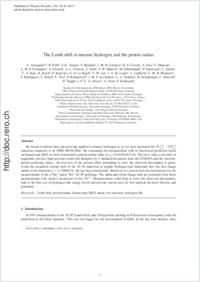The Lamb shift in muonic hydrogen and the proton radius
- Antognini, Aldo Institut f̈ur Teilchenphysik, ETH Z̈urich, Switzerland - Max–Planck–Institut f̈ur Quantenoptik, Garching, Germany
- Pohl, R. Max–Planck–Institut f̈ur Quantenoptik, Garching, Germany
- Amaro, F. D. Departamento de F́ısica, Universidade de Coimbra, Portugal
- Biraben, François Laboratoire Kastler Brossel, CNRS and Universit́e P. et M. Curie, Paris, France
- Cardoso, J. M. R. Departamento de F́ısica, Universidade de Coimbra, Portugal
- Covita, D. S. I3N, Departamento de F́ısica, Universidade de Aveiro, Portugal
- Dax, Andreas Physics Department, Yale University, New Haven, USA
- Dhawan, Satish Physics Department, Yale University, New Haven, USA
- Fernandes, L. M. P. Departamento de F́ısica, Universidade de Coimbra, Portugal
- Giesen, Adolf Institut f̈ur Strahlwerkzeuge, Universiẗat Stuttgart, Germany
- Gouvea, A. L. Departamento de F́ısica, Universidade de Coimbra, Portugal
- Graf, Thomas Institut f̈ur Strahlwerkzeuge, Universiẗat Stuttgart, Germany
- Hänsch, T. W. Max–Planck–Institut f̈ur Quantenoptik, Garching, Germany
- Hildebrandt, M. Paul Scherrer Institut, Villigen-PSI, Switzerland
- Indelicato, Paul Laboratoire Kastler Brossel, CNRS and Universit́e P. et M. Curie, Paris, France
- Julien, L. Laboratoire Kastler Brossel, CNRS and Universit́e P. et M. Curie, Paris, France
- Kao, Cheng-Yang Physics Department, National Tsing Hua University, Hsinchu, Taiwan
- Kirch, K. Institut f̈ur Teilchenphysik, ETH Z̈urich, Switzerland
- Knowles, Paul E. D́epartement de Physique, Universit́e de Fribourg, Switzerland
- Bigot, Eric-Olivier Le Laboratoire Kastler Brossel, CNRS and Universit́e P. et M. Curie, Paris, France
- Liu, Yi-Wei Physics Department, National Tsing Hua University, Hsinchu, Taiwan
- Lopes, J. A. M. Departamento de F́ısica, Universidade de Coimbra, Portugal
- Ludhova, Livia Département de Physique, Universitte de Fribourg, Switzerland
- Monteiro, C. M. B. Departamento de F́ısica, Universidade de Coimbra, Portugal
- Mulhauser, Françoise D́epartement de Physique, Universit́e de Fribourg, Switzerland
- Nebel, Tobias Max–Planck–Institut f̈ur Quantenoptik, Garching, Germany
- Nez, François Laboratoire Kastler Brossel, CNRS and Universit́e P. et M. Curie, Paris, France
- Rabinowitz, Paul Department of Chemistry, Princeton University, USA
- Santos, J. M. F. dos Departamento de F́ısica, Universidade de Coimbra, Portugal
- Schaller, Lukas A. D́epartement de Physique, Universit́e de Fribourg, Switzerland
- Schuhmann, Karsten Dausinger & Giesen GmbH, Stuttgart, Germany
- Schwob, Catherine Laboratoire Kastler Brossel, CNRS and Universit́e P. et M. Curie, Paris, France
- Taqqu, D. Paul Scherrer Institut, Villigen-PSI, Switzerland
- Veloso, J. F. C. A. I3N, Departamento de F́ısica, Universidade de Aveiro, Portugal
- Voss, A. Institut f̈ur Strahlwerkzeuge, Universiẗat Stuttgart, Germany
- Kottmann, Franz Institut f̈ur Teilchenphysik, ETH Z̈urich, Switzerland
-
03.08.2011
Published in:
- Physics Procedia. - 2011, vol. 17, p. 10-19
English
By means of pulsed laser spectroscopy applied to muonic hydrogen (μ− p) we have measured the 2S F = 1 1/2 − 2PF = 2 3/2 transition frequency to be 49881.88(76) GHz. By comparing this measurement with its theoretical prediction based on bound-state QED we have determined a proton radius value of rp = 0.84184 (67) fm. This new value is an order of magnitude preciser than previous results but disagrees by 5 standard deviations from the CODATA and the electronproton scattering values. An overview of the present effort attempting to solve the observed discrepancy is given. Using the measured isotope shift of the 1S-2S transition in regular hydrogen and deuterium also the rms charge radius of the deuteron rd = 2.12809 (31) fm has been determined. Moreover we present here the motivations for the measurements of the μ 4He + and μ 3He + 2S-2P splittings. The alpha and triton charge radii are extracted from these measurements with relative accuracies of few 10 − 4. Measurements could help to solve the observed discrepancy, lead to the best test of hydrogen-like energy levels and provide crucial tests for few-nucleon ab-initio theories and potentials.
- Faculty
- Faculté des sciences et de médecine
- Department
- Département de Physique
- Language
-
- English
- Classification
- Physics
- License
-
License undefined
- Identifiers
-
- RERO DOC 27281
- DOI 10.1016/j.phpro.2011.06.012
- Persistent URL
- https://folia.unifr.ch/unifr/documents/302139
Statistics
Document views: 132
File downloads:
- pdf: 153
